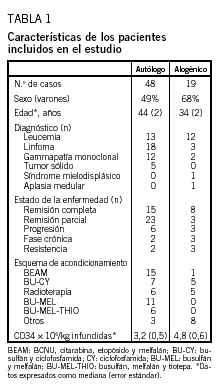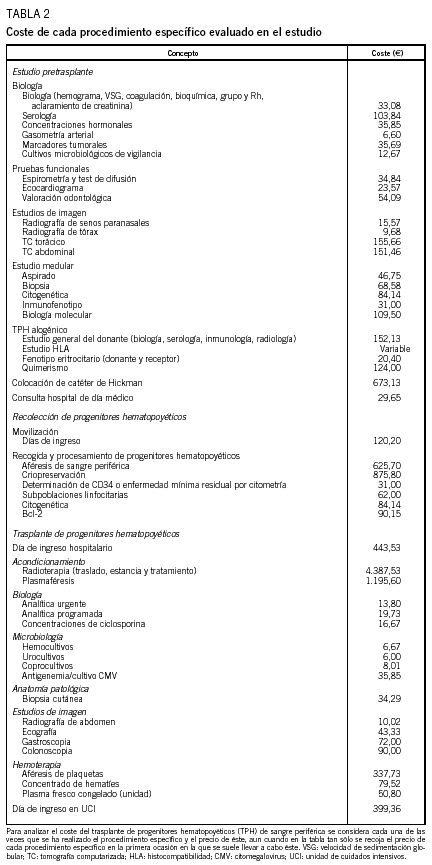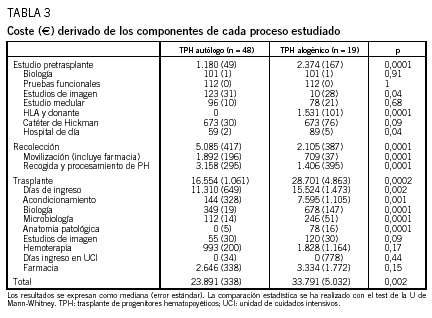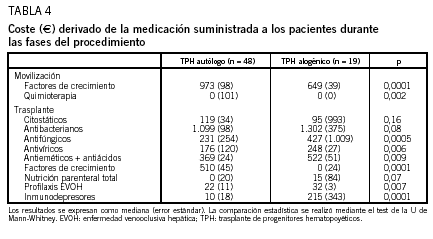Fundamento y objetivo: El trasplante de progenitores hematopoyéticos (TPH) de sangre periférica autólogo o alogénico se ha consolidado en las últimas décadas como parte del tratamiento de un número de enfermedades oncohematológicas. Existen sin embargo escasos estudios en nuestro medio que analicen el coste del procedimiento autólogo, y hasta la fecha se desconoce el impacto económico del procedimiento alogénico en nuestro sistema sanitario.
Pacientes y método: En el presente estudio se analizaron los gastos derivados de la realización de esta técnica en 67 pacientes consecutivos que recibieron un TPH autólogo (48 casos) o alogénico (19 casos) en un período de 2 años. Se valoraron en cada paciente los gastos derivados del estudio pretrasplante, de la recolección de progenitores hematopoyéticos y del procedimiento del trasplante propiamente dicho.
Resultados: La recolección de progenitores hematopoyéticos fue significativamente más cara en el TPH autólogo que en el alogénico (p = 0,0001), debido a la menor facilidad de movilización de estas células en enfermos ya tratados por su enfermedad de base y por el mayor desembolso secundario a los procesos de criopreservación. Sin embargo, los gastos del procedimiento de estudio pretrasplante fueron significativamente mayores en el contexto del TPH alogénico (p = 0,0001), lo que se explica fundamentalmente por el coste de los estudios de histocompatibilidad. Igualmente, el mayor coste del procedimiento de trasplante propiamente dicho cuando se infundió un injerto alogénico (p = 0,0002) se fundamentó principalmente en la hospitalización más prolongada de estos pacientes y en el mayor número de enfermos que precisaron de acondicionamientos que incluían la irradiación corporal total.
Conclusiones: De nuestro estudio se deriva que el gasto real total en nuestro medio de un TPH autólogo ronda los 24.000 e, y el del procedimiento alogénico se sitúa en torno a los 34.000 e.
Background and objective: Peripheral blood hematopoietic progenitor cell transplantation (PCT), both autologous and allogeneic, has been consolidated in the last decades as an important tool in the treatment of a number of oncohematologic malignancies. Nevertheless, there are scarce data about the real cost of the autologous procedure in our setting, and to date the economic impact of allogeneic PCT in our health system is unknown.
Patients and method: In the present study a comparative analysis of the economic cost of both methods of PCT was carried out in a series of 67 consecutive patients who were eligible for autologous PCT (n = 48), or allogeneic PCT (n = 19) in a 2 year study period. The expenses derived from pretransplant studies, from the collection and processing of hematopoietic progenitors, and from the transplantation procedure itself were evaluated.
Results: The collection of hematopoietic progenitors was significantly more expensive in autologous than in allogeneic PCT (p = 0.0001), owing both to the difficulty in the mobilization of such cells in patients who have been treated for the underlying disease and to the higher costs derived from the criopreservation of the collected material. Nevertheless, the costs of the pretransplant studies were significantly higher in allogeneic PCT due to the expenses of histocompatibility studies (p = 0.0001). Similarly, the costs derived from the transplantation procedure itself were significantly higher in allogeneic procedures (p = 0.0002) as those patients required a longer hospitalization, and also because of the higher number of patients requiring conditioning regimens including total body irradiation.
Conclusions: From these data we conclude that the real cost of PCT in our setting is 24,000 e for the autologous procedure, while it is 34,000 e in the context of allogeneic transplantation.
Artículo
Comprando el artículo el PDF del mismo podrá ser descargado
Precio 19,34 €
Comprar ahora










